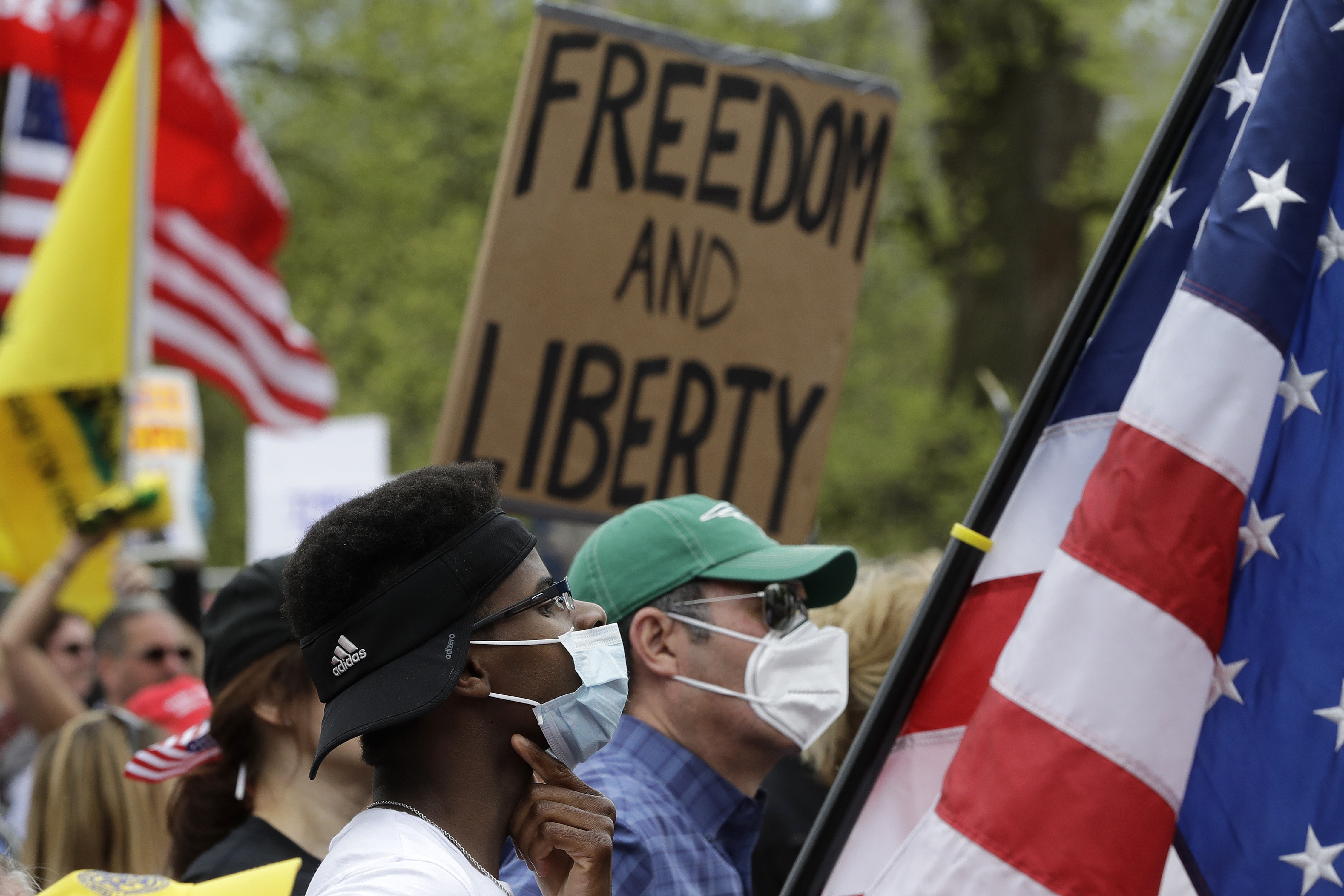CNN has published an opinion article calling out the Trump administration for saying that "China is the cause of American's problem" and calling the new type of coronavirus "the big lie."
On the same day Foreign Policy cited a scholar pointing out that the idea of "making China legally liable is… foolish."

Demonstrators display flags and placards during a protest in front of the Statehouse in Boston, the U.S., May 4, 2020. /AP
Demonstrators display flags and placards during a protest in front of the Statehouse in Boston, the U.S., May 4, 2020. /AP
In an opinion piece published by CNN on Wednesday, author Jeffrey D. Sachs, director of the Center for Sustainable Development at Columbia University, said the "meme" of "Make China Pay" has worked because it plays into American smugness that if China is succeeding, they must be cheating.
Since President Trump took office in 2017, his approach to U.S.-China relations has included increased pressure via tariffs and trade war rhetoric, and now, with the onset of an unprecedented pandemic, roughly two-thirds now say they have an unfavorable view of China, up nearly by 20 percentage points since the start of the Trump administration, the Pew Research Center concluded in one of its surveys of Americans in March.
"Trump is our present-day Senator Joseph McCarthy, who uses lies and innuendos to scare Americans into submission," Sachs added.
The U.S. has now seen the most confirmed cases and deaths due to the pandemic globally. There was plenty of warning, wrote Professor Sachs in the article, listing a timeline of how China and the World Health Organization alerted others about the virus.
A key election issue
It is also important to note that the narrative of making China pay is unfolding during Washington's "political silly season" in the run up to the presidential election, pointed out Doug Bandow, senior fellow at the Cato Institute, in his opinion piece published on Foreign Policy.
The unofficial slogan "Make China Pay" reflects the usual tactics of Trump using China as a campaign prop for partisan gains.
The recent flurry of lawsuits against China serves a political tool for Republican leaders facing election in November, Tom Ginsburg, professor of international law at the University of Chicago, said during an interview with Reuters.
"We are seeing a lot of people on the political right focus on the China issue to cover up for the U.S. government's own errors," Ginsburg said.

A store in Miami Beach, Florida, the U.S., April 30, 2020. /AP
A store in Miami Beach, Florida, the U.S., April 30, 2020. /AP
Senator Tom Cotton of Arkansas, Republicans, who is well-known for leading political witch hunts against Chinese companies, has been openly peddling conspiracy theories about the Wuhan virus lab since February.
The Five Eyes intelligence alliance and even U.S. leading health expert Anthony Fauci have thrown cold water on Trump's claims that the virus originated from a Chinese lab.
However, Secretary of State Mike Pompeo is still saying that he had "seen evidence that this likely came from the Wuhan Institute of Virology," without showing any such evidence.
Read more:
'Attack China': GOP sends memo to candidates on deflecting anger over coronavirus
"Using judicial means to undermine China is a tried and tested method by U.S. politicians," said Jiang Zhenchun, a law professor at Nanjing Audit University.
Even though these lawsuits will probably not go very far, there will be political gains to be made in terms of public opinion in the lead-up to the 2020 election.
Can China be sued?
The short answer is no.
For starters, China cannot be sued in another country because it is protected by the common principles in international law known as sovereign immunity, which shields foreign governments, government agencies and officials from litigation. The Foreign Sovereign Immunities Act (FISA) is a federal law in the United States since 1976.
Legal experts are largely in agreement that it is unlikely these lawsuits will even get off the round.
Writing on Bloomberg, Stephen L. Carter, a law professor at Yale University, said that regardless of alleged culpability, as a nation state China is immune to this type of lawsuits.
"Simply put, any scholar or practitioner with working knowledge of the law of foreign sovereign immunity would have taken one look at the headlines about these lawsuits (as I did) and assess immediately that there is no basis for jurisdiction in a U.S. court," Chimène Keitner, professor of international law at the University of California Hastings College of the Law, wrote about the U.S. lawsuits on legal opinion site JustSecurity.org.
The American attorneys representing these cases are obviously aware of this. To get around this legal obstacle, they are claiming exceptions to immunity for commercial activities and even terrorism in the U.S., or by naming individual scientists as defendants. But as numerous experts have pointed out, the arguments for commercial activity and terrorism exceptions are very hard to substantiate in this case.
Read more:
Suing China for COVID-19 is not taking international law seriously

The U.S. Supreme Court on Capitol Hill in Washington, D.C., the U.S. /AP
The U.S. Supreme Court on Capitol Hill in Washington, D.C., the U.S. /AP
'Dangerous precedent'
If the U.S. Congress voted to allow Americans to sue the Chinese government regardless the international law, the Chinese government can reciprocate by authorizing its citizens to do the same thing. Then, the rest of the world could follow and adopt corresponding legislation.
"It would set an extraordinarily dangerous precedent," Bandow warned in his article in Foreign Policy.
"Imagine the rest of the world 'making America pay' for Washington's mistakes, failures, and crimes."
If Congress passes new legislation to redefine the protection of sovereign immunity in order for this type of lawsuit to go forward, there can still be litigation risk, according to Stephen J. Brogan, managing partner of law firm Jones Day.
The last time the U.S. suffered mass injury allegedly linked to a foreign government, Congress did just that. After the September 11 attacks in 2001, multiple actions were brought against Saudi Arabia on behalf of 9/11 victims. Some are ongoing to this day.
The Justice Against Sponsors of Terrorism Act (JASTA), which amended the FSIA to allow actions against foreign governments for damages caused by acts of international terrorism, was passed in 2016, overriding a veto from former president Barack Obama. This was a more limited action but still proved to be quite controversial.
After voting for JASTA, which Obama called "a dangerous precedent," some Republican lawmakers almost immediately regretted what they saw were the "unintended ramifications" for the U.S. government in other countries.
"Congress cannot create an exception to foreign sovereign immunity every time the United States is adversely affected – even catastrophically – by another country's actions," Keitner of the University of California said.
(Li Qian and Wang Yan also contributed to the story.)